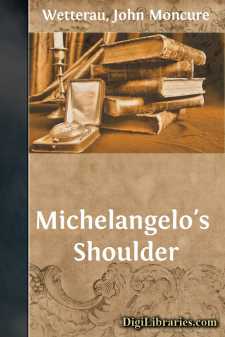Categories
- Antiques & Collectibles 13
- Architecture 36
- Art 48
- Bibles 22
- Biography & Autobiography 813
- Body, Mind & Spirit 142
- Business & Economics 28
- Children's Books 17
- Children's Fiction 14
- Computers 4
- Cooking 94
- Crafts & Hobbies 4
- Drama 346
- Education 46
- Family & Relationships 57
- Fiction 11829
- Games 19
- Gardening 17
- Health & Fitness 34
- History 1377
- House & Home 1
- Humor 147
- Juvenile Fiction 1873
- Juvenile Nonfiction 202
- Language Arts & Disciplines 88
- Law 16
- Literary Collections 686
- Literary Criticism 179
- Mathematics 13
- Medical 41
- Music 40
- Nature 179
- Non-Classifiable 1768
- Performing Arts 7
- Periodicals 1453
- Philosophy 64
- Photography 2
- Poetry 896
- Political Science 203
- Psychology 42
- Reference 154
- Religion 513
- Science 126
- Self-Help 84
- Social Science 81
- Sports & Recreation 34
- Study Aids 3
- Technology & Engineering 59
- Transportation 23
- Travel 463
- True Crime 29
Michelangelo's Shoulder
Description:
Excerpt
Michelangelo's Shoulder
It dawned hot in Georgia. Don rubbed his head and blinked. He got out of bed and paused before a makeshift easel where a drawing, taped to a board, showed a woman sitting on a park bench. She was large, dressed in layers of multi-colored cotton. She reminded him of the Renoir woman in her plush living room, the dog sprawled at her feet, but she was smarter. The line across her eyebrows and tapering along her jaw was right. He'd left out a lot, but that didn't matter. If what was there was true enough, you knew the rest—like a Michelangelo shoulder emerging from stone.
He went into the bathroom and splashed water on his face.
After coffee and a piece of toast, he rolled the drawing and took it to the park where the woman fed pigeons every day. She wasn't there. She wasn't there the next day, either. The following day Don brought a loaf of bread, sat on her bench, and tossed white pellets into the air. Birds fought for each piece. He prepared the remaining bread and scattered it in one throw. "There you go—something for everybody. She'll be back soon."
A week later, she showed up. Don moved aside and asked, "Where you been?"
"Took sick."
"I've been feeding the pigeons."
"I was worrying. Thank you."
"I did a drawing of you. I wanted to name it, but—I didn't know your name."
"Ruby."
"Ruby, ah. I'm Don. You want to see it? I'll bring it tomorrow."
"Sure."
"O.K. How you feeling?"
"Better, now."
"Good." He walked to his usual bench and sat down. The sun beat on the live oak trees and sage-green strings of Spanish moss while the birds made happy sounds in front of Ruby. She had lost weight, he thought, but it was hard to tell, the way she dressed. She was a beauty once. He remembered his bloodshot eyes in the bathroom mirror. None of us getting any younger. He would give her the drawing in the morning and take off. It was time to leave Savannah, past time. Head for Portland again. Look up Lorna.
Lorna. The Art Students League. It seemed like last week that she was looking carefully into his eyes and shaking his hand, curious and unafraid, different from him in many ways, but similar in that. Painter's eyes, he thought, clear and unblinking. Couldn't tell how good she was, though—eyes are one thing; talent is another. And hard work is another.
She lived in a studio behind her parents' house on a mountain road—what was it called?—the Glasco Turnpike. Her father, Lad Charles, was a painter, a friendly guy who wore bow ties and was well liked in town. Lorna was protected, highly educated, out of reach for Don Delahanty.
He was blocky. She was slim. His neck was thick and turned with his body; her neck was graceful and turned by itself. His eyes were a slatey blue—the color of the sea on a cloudy day. Hers were almond with flecks of green. He was fair skinned. Lorna was tanned. His hair was sand colored, prematurely grizzled. Hers was light brown, sun streaked, thick, and cut short—perfect for small gold earrings. She brought with her the smell of spring....





